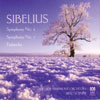Sibelius Symphonies Nos 2 & 7; Finlandia
They like their Sibelius sober in Australia but there’s a rousing Finlandia to enjoy
View record and artist detailsRecord and Artist Details
Composer or Director: Jean Sibelius
Genre:
Orchestral
Label: ABC Classics
Magazine Review Date: 1/2008
Media Format: CD or Download
Media Runtime: 71
Mastering:
Stereo
DDD
Catalogue Number: ABC476 6167

Tracks:
| Composition | Artist Credit |
|---|---|
| Symphony No. 2 |
Jean Sibelius, Composer
Adelaide Symphony Orchestra Arvo Volmer, Conductor Jean Sibelius, Composer |
| Symphony No. 7 |
Jean Sibelius, Composer
Adelaide Symphony Orchestra Arvo Volmer, Conductor Jean Sibelius, Composer |
| Finlandia |
Jean Sibelius, Composer
Adelaide Symphony Orchestra Arvo Volmer, Conductor Jean Sibelius, Composer |
Author: Peter Quantrill
Arvo Volmer conducted the Adelaide orchestra of which he is music director in a well received four-concert Sibelius festival earlier in 2007, and a fine Mahler Second to close the Adelaide Festival in October that more than compensated for some fragile string and brass tone with a sound grasp of its properly symphonic credentials – much more Boulez than Bernstein. Enthusiasts for Tubin and Madetoja have praised the symphonic cycles conducted by Volmer on Alba for similarly no-nonsense merits.
I wonder, though, whether that’s enough to command attention at full price when the likes of Sir Colin Davis and the LSO are available for a fraction of the cost. Peteri Sakari’s Naxos cycle (12/07) is similarly plain‑spoken, and his Icelandic band has more to offer than its Australian counterpart for Volmer, especially in the matter of that indefinable desideratum, character. The woodwinds at the start of the Second don’t have it, though the recording doesn’t help, terracing the sections much to the benefit of the softly contoured string sections, and so making Sibelius’s all-important timpani parts somewhat ill-focused and boomy.
The opening of the second movement is all but inaudible, as is currently the fashion, though thereafter Volmer husbands its eventful progress adroitly enough. It’s in the build-up to the finale that his sober-sides approach starts to tell, and the finale itself sags badly, unsupported by the bravado that such macho symphonic rhetoric rather demands.
The Seventh works better in its unpretentious way, minimising the many tempo changes to create a single symphonic wave, and the balance reveals some telling string details at points such as the return to the first subject at 12'20". When the wave should crash, however, it tails away, and the unmarked crescendo on the final bar is too little, too late. Finlandia makes a rousing, welcome encore, which says it all, really.
I wonder, though, whether that’s enough to command attention at full price when the likes of Sir Colin Davis and the LSO are available for a fraction of the cost. Peteri Sakari’s Naxos cycle (12/07) is similarly plain‑spoken, and his Icelandic band has more to offer than its Australian counterpart for Volmer, especially in the matter of that indefinable desideratum, character. The woodwinds at the start of the Second don’t have it, though the recording doesn’t help, terracing the sections much to the benefit of the softly contoured string sections, and so making Sibelius’s all-important timpani parts somewhat ill-focused and boomy.
The opening of the second movement is all but inaudible, as is currently the fashion, though thereafter Volmer husbands its eventful progress adroitly enough. It’s in the build-up to the finale that his sober-sides approach starts to tell, and the finale itself sags badly, unsupported by the bravado that such macho symphonic rhetoric rather demands.
The Seventh works better in its unpretentious way, minimising the many tempo changes to create a single symphonic wave, and the balance reveals some telling string details at points such as the return to the first subject at 12'20". When the wave should crash, however, it tails away, and the unmarked crescendo on the final bar is too little, too late. Finlandia makes a rousing, welcome encore, which says it all, really.
Discover the world's largest classical music catalogue with Presto Music.

Gramophone Digital Club
- Digital Edition
- Digital Archive
- Reviews Database
- Full website access
From £8.75 / month
Subscribe
Gramophone Full Club
- Print Edition
- Digital Edition
- Digital Archive
- Reviews Database
- Full website access
From £11.00 / month
Subscribe
If you are a library, university or other organisation that would be interested in an institutional subscription to Gramophone please click here for further information.




